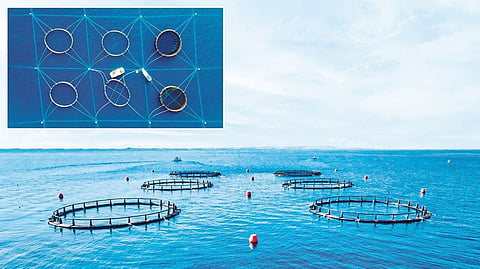Abu Dhabi's Dalma Fish Project uses AI to boost sustainable aquaculture in the UAE
The farm is expected to produce over 100 tonnes of fish annually

In alignment with Abu Dhabi Government’s policy on sustainable aquaculture, the Dalma Fish Project has achieved significant success in cultivating local fish species through a marine cage farming system. The Dalma Fish Farm has officially commenced production of key local species such as Safi, Shaari, Qabit, and Hamour. This initiative marks the first of its kind in the Middle East to implement artificial intelligence (AI) technologies for the management and operation of a marine fish farming project.
The project, located off Dalma Island and utilizing marine cages and AI tools, has received strong interest from consumers upon launch, offering high-quality local fish to the market. The farm is expected to produce over 100 tonnes of fish annually, including the aforementioned species, with the goal of supporting sustainable aquaculture practices. This includes farming economically important local species that are under pressure from overfishing, based on fish stock assessment studies conducted by the Environment Agency – Abu Dhabi (EAD).
Artificial Intelligence Integration
The project features a state-of-the-art monitoring and data collection system powered by artificial intelligence — the first of its kind in the Middle East. This system is designed to provide highly efficient management solutions for aquaculture operations.
It includes environmental sensors that monitor key water quality parameters such as temperature, pH, salinity, dissolved oxygen, turbidity, and ammonia levels. Additionally, underwater and surface cameras are used to monitor fish behavior and assess feeding efficiency. A smart platform enables the transmission, storage, and analysis of collected data.
Sustainable aquaculture
The Environment Agency – Abu Dhabi is committed to implementing the initiatives outlined in Abu Dhabi’s Sustainable Aquaculture Policy. This policy sets a vision for the growth of the aquaculture sector in the emirate by enhancing its competitiveness, alleviating pressure on overexploited local fisheries, and promoting a local strategy for an environmentally sustainable, economically viable, and socially responsible aquaculture industry. Such efforts aim to meet the growing demand for seafood consumption in Abu Dhabi and the UAE.
Fisheries index milestone
EAD has made remarkable progress in improving the sustainable fisheries index, increasing it from 8.9% in 2018 to an impressive 97.4% by the end of 2024. This achievement positions Abu Dhabi as the global leader in this indicator. EAD has undertaken several recovery measures to support sustainable fish stocks, including:
Regulating fishing activities and encouraging the use of sustainable fishing gear
Organizing recreational fishing practices
Effectively managing six marine protected areas under the Sheikh Zayed Protected Areas Network
Supporting the development of sustainable aquaculture
Enhancing fish stock through coral farming and the installation of artificial coral structures under the “Abu Dhabi Coral Gardens” initiative
100 tonnes of fish annually
The fish farming initiatives are overseen by the Environment Agency – Abu Dhabi. The first pilot project for fish cage farming in Dalma Island was launched approximately two years ago and includes six marine cages. The project aims to support marine aquaculture research and to study the impact of environmental variables on the growth and survival of farmed fish.
EAD confirmed that, once completed, the Dalma Island project will produce 100 tonnes of local fish annually (Hamour, Shaari, Qabit, and Safi) using six marine cages. The focus is on enhancing sustainable marine aquaculture by cultivating economically important and overexploited local species, in line with the agency’s fish stock assessments.
EAD also completed a hydrodynamic modeling project to support and develop marine cage aquaculture in Abu Dhabi. The study examined three sites west and southeast of Dalma Island to determine the carrying capacity of each location and the number of fish tonnes that can be farmed sustainably in the marine environment.
Results showed that the sites are suitable for establishing cage farming systems. As a result, EAD proceeded with implementing the pilot fish cage farming project at Dalma Island.
In addition, EAD launched a project to identify suitable marine aquaculture sites in the Sila area of the Al Dhafra region. Last year, the agency completed data collection, stakeholder engagement, environmental and technical site selection criteria, and identified suitable locations within Sila’s marine waters.
Sustainable aquaculture policy
This initiative is part of EAD’s broader plan to implement the Sustainable Aquaculture Policy for Abu Dhabi. The strategy envisions enhancing the growth of the emirate’s aquaculture sector, improving its competitiveness, reducing the strain on overfished local stocks, and promoting a local approach to developing an environmentally friendly, economically feasible, and socially responsible aquaculture sector — one that can meet the rising seafood demand in Abu Dhabi and the UAE.
Sign up for the Daily Briefing
Get the latest news and updates straight to your inbox


